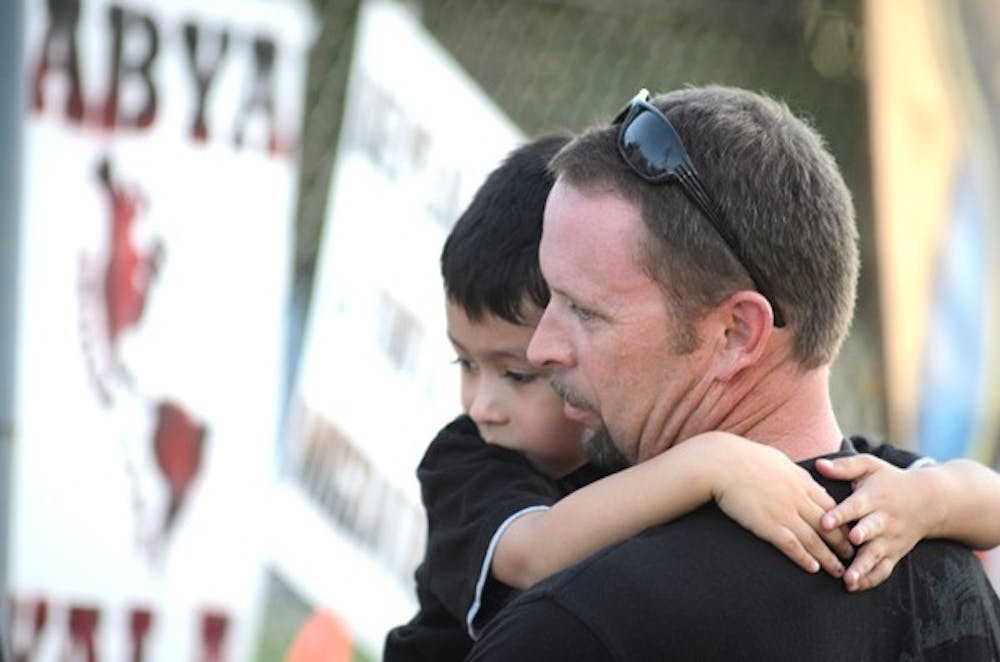Inspiring protests, artwork and candlelit vigils at the state’s capitol, Arizona’s controversial immigration law, Senate Bill 1070, is still a top issue since parts of the bill went into effect July 29 of last year.
After its passage in April 2010 and its signing by Gov. Jan Brewer just four days later, several lawsuits have been filed challenging the law and a preliminary injunction has blocked key portions pending these cases.Far from fading into the background, however, the law remains a top priority for both student activists protesting the law and elected officials seeking to protect it, and has been the model for several other states that have passed similar legislation.
Governor’s office spokesman Matthew Benson said the preliminary injunction granted by U.S. District Judge Susan Bolton on July 28, 2010 has been affirmed by the U.S. Court of Appeals for the Ninth Circuit, but will be challenged all the way to the Supreme Court.
“SB 1070 and border security remain top priorities for Governor Brewer and that’s evident in her pursuit of the SB 1070 case to the U.S. Supreme Court,” Benson said.
The state will file a petition to the nation’s highest court on or before Aug. 10 to hear the case and deliver a final ruling on the preliminary injunction. The state also hopes to be able to implement the law while the legal challenges continue to be decided by the courts.
Arizona raised slightly less than $3.8 million from private donations to defend the law and has spent more than $2 million of it, including the state’s countersuit claiming the federal government failed to enforce federal immigration statute.
When the law was passed, ASU students were involved in protests of the law and some, called the Capitol Nine, were arrested after chaining themselves to the capitol in Spring 2010.
Students have continued their efforts to protest the law and one group is focused on increasing awareness and knowledge of why immigration happens, said senior English literature and conservation biology major Ginger Hanson, founder and president of Students for Global Justice.
Puente Arizona, a group of immigration activists in Phoenix, held a Cultural Night of Resistance on Friday to celebrate one year of non-compliance with the law and Hanson’s group supported the event.
“The law is still being challenged in the courts so we have to keep lending our voice whenever we can to those challenges,” Hanson said.
The July 29 resistance rally promoted Hispanic culture and continued opposition to the law and others like it, said economics senior Danielle Bäck, president and co-founder of ASU Coalition for Human Rights, a group that also supported the event.
Despite the law being temporarily blocked, Bäck said people need to continue to combat what the law represents.
“We’re still concerned with the anti-immigrant sentiment behind it,” she said. “Other states are copying the law that was passed here in Arizona, and by stopping it here we can have an effect on the whole nation.”
Gloria Montaño Greene, Washinton office director for the federal advocacy group National Association of Latino Elected and Appointed Officials, said more than 30 copycat laws have been introduced nationally.
They’ve passed in Utah, Georgia and Indiana, where portions of the law have been blocked in legal challenges, and Alabama, where a lawsuit has been filed, and South Carolina, where a lawsuit will be filed soon.
The group is working to aid lawmakers in other states in combating the passage of SB 1070 look-a-likes, she said.
“Right now there’s a huge uptick of states taking immigration into their own hands and not respecting that it is a federal issue,” Greene said.
ASU Professor of Law Carissa Hessick said a final decision on the law could take years, and if Judge Bolton’s ruling to block portions of the law pending an official outcome stands, the state will be unable to implement it.
“Civil cases can hang around for a really long time,” Hessick said. “If the State of Arizona can get the U.S. Supreme Court to reverse Judge Bolton and the Ninth Circuit’s decision, Arizona would be allowed to enforce the law while the rest of the lawsuit goes forward.”
The Governor’s office expects to hear whether the Supreme Court will hear their appeal on the preliminary injunction by January 2012.
Reach the reporter at ymgonzal@asu.edu




